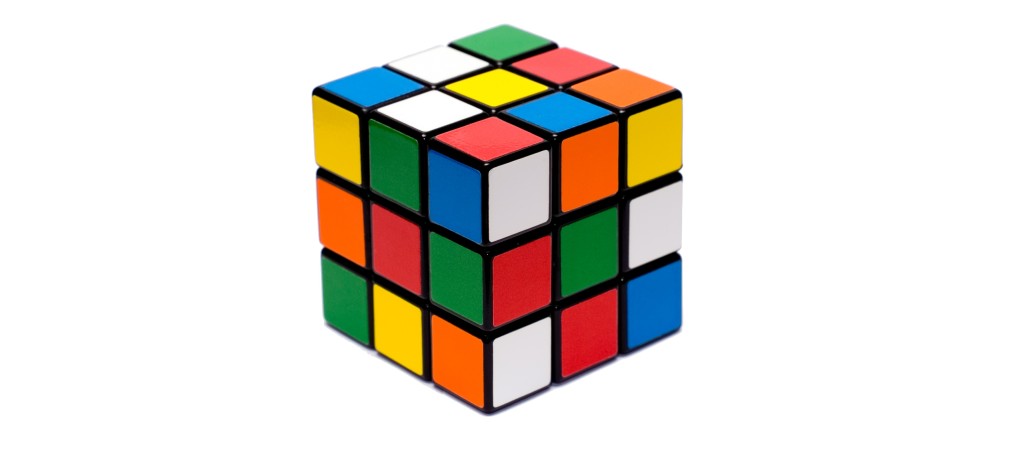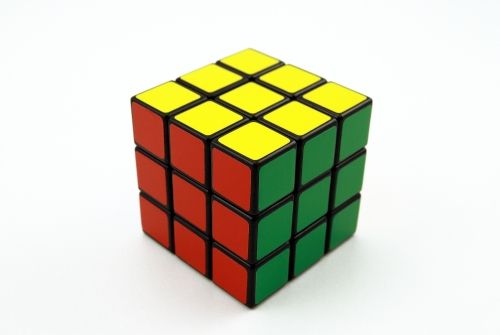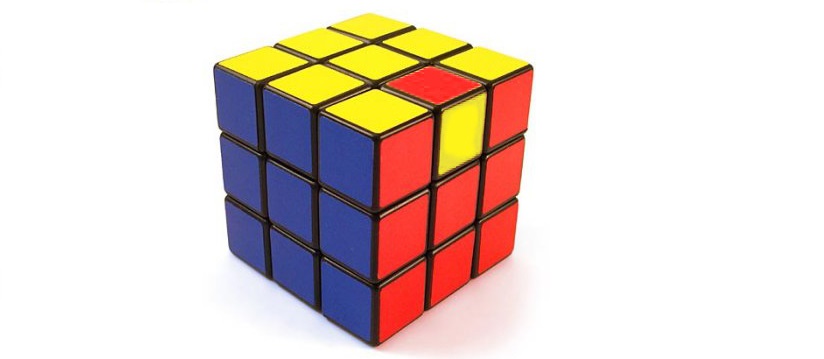The humble Rubik’s cube can teach us something profound about the world.
Since its invention in 1974, the cube has created a passionate following. We enthusiasts even have a name: “Cubists”. Once you know the secret, solving a Rubik’s cube is very relaxing and satisfying. It’s like a mental massage for people on the OCD spectrum.
But besides being a hobby, the cube can serve as a tool for philosophy – like anything else, once you begin to understand its underlying abstract principles. The Rubik’s cube can teach us about logic, the nature of paradoxes, and even the differences between rationalism and empiricism.
From the Foundations
To learn from the cube, we have to dive into the world of abstractions, and we must start at the very beginning. What is a Rubik’s cube? Simple: it’s a puzzle. It’s an assortment of pieces that are out-of-order, and the human mind’s job is to put them into order.
A scrambled Rubik’s cube appears to be in a state of patternless, senseless disorder.
A solved Rubik’s cube makes ordered sense. Each unique color is isolated to its own side.
The human mind, as I’ve written about before, is the tool which turns the former into the latter. This pattern is not unique to the Rubik’s cube; it’s what puzzles are all about – jigsaw puzzles, Sudoku, crosswords, etc.
Entertain the first analogy: this pattern of turning senseless into sensible is similar to using language. Humans create sounds with their vocal cords, but those sounds aren’t merely sounds – in the right pattern, they become meaningful. Take this sentence, for example:
“Cat the the over jumped chair.”
In this order, this sentence is a language-fail. It doesn’t mean anything. But what if you treat it like a puzzle? Re-arrange the parts, and see what happens:
“The cat jumped over the chair.”
The exact same words in a different order. But this time, it means something. Our ears might hear the same sounds, but in this order, sensibility is brought into existence. Communication happens.
It’s like the words in this sentence are individual cubes on a Rubik’s cube. Simply twist and turn the cube – change the order of words in a sentence – and you can create something sensible. Keep this analogy in mind; it directly applies to the existence of paradoxes, and we will return to it later.
Solving Scrambles
True story: the Rubik’s cube was kind of an accident. It wasn’t created as a toy. In the 70’s, a Hungarian professor named Erno Rubik created the cube as a tool to teach students about spatial relationships. At some point, he accidentally scrambled it too much and then couldn’t get it unscrambled.
He worked on it for over a month before he figured out how to unscramble it, and then realized he had created something special. It’s now considered to be the world’s best-selling toy.
Put yourself back in the 70’s, before anybody had solved the cube. It was an open question whether or not it was even solvable by a human. The reason is because of simple mathematics: there are about 43 quintillion possible combinations for the Rubik’s cube – making it virtually impossible unscramble by chance. Erno discovered a method of sorting through the combinations; he’d solve the corner pieces first, then put the middle/edge pieces in their proper place. It worked. Since the 70’s, however, people have developed very complex and accelerated ways to solve the cube. The best “speed-cubers” are able to solve it easily under ten seconds.
Consider this question: can every possible scramble of the Rubik’s cube be solved? All 43 quintillion?
There are two answers, both equally profound: “yes” and “no”. We’ll start with “yes”.
Regardless of how long you scramble the cube, it can always be solved. It’s a logical, mathematical necessity. I know it with certainty, and you can too.
But think for a moment about remarkable this is. How is it possible to know such a thing? Surely, “all possible combinations” have never been actually solved – the data set is too big. To what am I appealing to know with certainty that the cube can always be solved?
The answer is what I keep writing about on this website: logic. If you start with a solved Rubik’s cube, you can scramble it for the rest of your lifetime, and just before you die, I guarantee it can be solved – even though that particular scramble has likely never been solved before.
This holds true for larger cubes, too. They don’t simply make 3×3’s. They make 4x4s, 7x7s, and the current world record is a staggering 17×17 – which you can watch be solved here. But here’s the underlying truth: you could have a Rubik’s cube the size of the solar system, and I know it is solvable in theory. Even if it wouldn’t be possible to solve in practice, given the amount of work it would take to solve it, you can still know it’s solvable in principle.
This way of reasoning is analogous to “rationalism” – understanding abstract principles, and regardless of the empirical data, arriving at true conclusions. In fact, even if all your evidence points to the fact that “the cube has never been solved”, you can know still know it’s solvable. Once we understand the logic behind the cube, we simply don’t need to appeal to empirical data. Every move that can be made, can be made in reverse.
This is also why sound mathematical reasoning is so profound – it’s true, applicable to the real world, and not dependent on empirical evidence. It, too, is an extension of pure logic.
Solving Paradoxes
The Rubik’s cube is a great analogy to critical reasoning in general. Returning to our language-analogy, if you start with a sensible sentence (regardless of the length), it doesn’t matter how long you scramble the words – or how senseless the resulting combination of words appears – it can be unscrambled into something sensible.
The same is true of our concepts. If we start with sensible concepts, it doesn’t matter how much you scramble them, hide them, obfuscate, or confuse them – if you have the patience, you can return to sensibility.
Now, as I have written about, there is a large group of people who object to this kind of sensibility. They are paradox-seekers; I call them “irrationalists”. They desperately want to find a scramble of words/concepts that is inherently contradictory. They argue that, “This scramble can never be solved! And it’s because our Reason is limited and flawed!” Then, they will often appeal to the liar’s paradox or quantum physics to prove their claims.
This is no different than the child who scrambled the Rubik’s cube for a month and concludes, “Gosh, this time it really is unsolvable! Nobody could ever make sense of what I’ve done! This cube is now beyond comprehension!”
They do not understand the nature of logic. It doesn’t matter how long you scramble; it doesn’t matter if you’re able to solve it within a lifetime; it can certainly be solved.
The philosopher’s job is to solve the puzzle – to sit down and sort through the concepts, twisting and turning the figurative cube, until things finally get cleared up and make sense again.
Paradoxical Combinations
Ah, but things aren’t quite so easy. Our analogy goes even deeper. Remember the question, “can all possible scrambles be solved?” One can accurately answer “no”. How is this possible?
If you start with an unsolvable Rubik’s cube in the first place.
Rubik’s cubes can be disassembled. Then, when they are reassembled, you can place pieces into positions that they otherwise could never get in – creating an “unsolvable scramble.” In other words, if you break the rules from the beginning and start with a tainted cube, you won’t be able to solve it.
So in actuality, the total possible combinations for a Rubik’s cube isn’t 43 quintillion. It’s around 519 quintillion – only a twelfth of which are actually solvable. Doesn’t that throw a wrench into everything I just claimed?
What if paradoxes are like an unsolvable scramble – it doesn’t matter how long you twist and turn according to your logical rules, the puzzle is inherently unsolvable. Could reality be filled with such irrational scrambles?
Not at all.
Think once more about our language analogy. We know we can unscramble the words “The cat jumped over the chair”, regardless of their combination. But, that’s only because we’re starting from a sensible sentence. What if we start with a nonsensical sentence to begin with – if we start with a broken Rubik’s cube, if you will. Take the words:
“Belonging walnut sixteen potent under.”
By George – we’ve created an unsolvable scramble! It doesn’t matter how long we twist and turn these words; we will never make sense of them. But so what? Only a fool would conclude, “Ah, this combination of words is inherently senseless; therefore reality is paradoxical!”
Unsolvable scrambles simply demonstrate that you’ve started with an error from the beginning. It’s precisely the error in the liar’s paradox.
“This sentence is false” merely appears to be sensible. As I explain here, it actually isn’t. It’s nonsense – not because reality is nonsensical, but because the sentence is flawed from the beginning.
Seeking “true paradoxes” because of sentence construction is like saying, “If we can find a nonsensical way to assemble these words/concepts, then we’ll prove reality doesn’t make sense!”
It’s a fool’s errand, to say the least. It’s not difficult to create a nonsensical string of words, and it’s not difficult to disassemble the Rubik’s cube into something unsolvable. Doing so isn’t profound; it’s irrelevant. It’s just creating gibberish; there wasn’t something sensible to begin with in the first place.
Identity and Logic
One final analogy. Right after Erno Rubik created his cube – but before it had been solved the first time – he was in an incredibly unique position. He was the only person who saw the cube ordered properly from the beginning. He could know – though nobody else could – that the cube was actually solvable, because he saw it assembled the right way.
In a sense, he knew the answer from the beginning.
And the same is possible in philosophy.
How do we know reality was assembled the right way from the beginning? Perhaps things only appear sensible, but we’ll discover that we’re living inside of some unsolvable scramble?
This is the profound understanding you gain from understanding the nature of logic. The principles of logic are necessary and inescapable; it’s not an open question whether or reality is “inherently contradictory”. They must be exactly the way they are, and they couldn’t possibly be any other way.
This is precisely why I write so much about logic. It lets you know the answer from the beginning.
The law of identity – that A is A (a thing is a thing) – is a necessary, universal truth. When you understand why, it’s exactly like seeing the Rubik’s cube in its fully solved state.
Thus, at the very beginning of any philosophic journey, one must begin with logic. It is the objective standard to which everything else appeals. It gives certain insight into the nature of all paradoxes – they are all just a matter of unscrambling language to reveal errors.
So, what appears to be a simple puzzle can be turned into a powerful tool for understanding language, paradoxes, and even the nature of reality itself.


